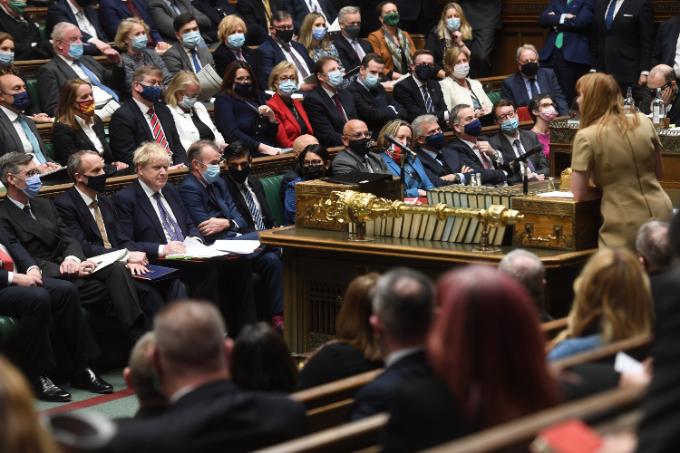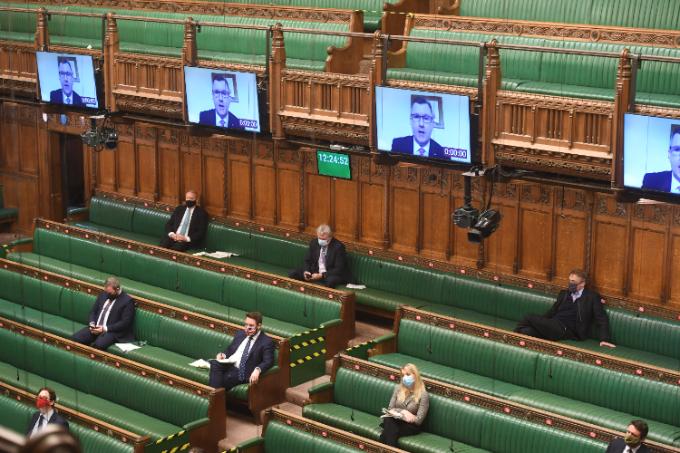Covid in Parliament: What Is Westminster's 'New Normal'?
Speaker Lindsay Hoyle wears a mask on his way into the House of Commons Chamber | All photos credit: UK Parliament/Jessica Taylor
7 min read
As Omicron continues to rage, and with the end of the pandemic proving elusive, how will Westminster adjust to the ‘new normal’? Laurence Sleator takes the temperature of a febrile Parliament
It was known as the “Jacob Rees-Mogg conga”. In early June 2020, MPs returning to Westminster following the first lockdown found themselves standing for 44 minutes in a socially distanced line that snaked through the House of Commons and Westminster Hall, and ended a full kilometre away in Portcullis House. After seven weeks of hybrid proceedings, the MPs were queuing to give their verdict on the government’s plan to end remote debating and voting and get everyone physically back in the Chamber.
This came at a time when non-essential shops were still closed, travel between the UK’s devolved nations was effectively banned and public health advice to those most vulnerable – including many MPs – remained to shield in their homes.
“How very British. We could vote electronically and crack on with business in Parliament or we can stand in queues,” one MP said ruefully at the time.
The “conga” perfectly encapsulates Parliament’s at times confused response to the pressures of Covid; a response complicated by the dynamics of an institution run almost entirely by convention and maintaining enormous powers of self-determination.
But with the public consistently told they need to learn to live with Covid, the same must apply to parliamentarians.
Moving forward, is it feasible to expect MPs to travel 200 miles from a remote constituency to super-spreading Westminster, or for peers, many of them elderly, to continue to pack themselves into the voting lobbies when a new variant is surging? Or has Covid presented the opportunity to re-examine and improve certain practices, some of which haven’t been changed since the 13th century?

A packed House of Commons for Prime Minister's Questions, 5 January 2022
As head of the Commons Procedure Committee, it is the job of Conservative MP Karen Bradley to consider precisely this question.
She tells The House her committee wants to investigate what aspects of the hybrid Parliament should be retained “once the pandemic is over”.
Everyone is hoping for that point to come soon, but the opposition parties want contingency measures in place now just in case the hypothetical “sigma” or “omega” variant comes down the line, or coronavirus proves endemic.
“At the moment I would say there is a majority for keeping things as they are with full physical participation and full physical voting. But what we’ve proved through the pandemic is Parliament can adapt if it has to,” Bradley says.
“There’s nothing to say that in a future Parliament, or even later in this Parliament, MPs might say ‘actually we would like to have more flexibility about the way we participate’.”
The hybrid Commons as we knew it came to an end just before the 2021 summer recess.
Over the course of 14 months there were, at certain stages, limits to the number allowed in the Chamber, with Prime Minister’s Questions and other departmental questions taking place via Zoom. The capacity to vote electronically, or via a proxy for some, with new “smart vote” card readers installed in the division lobbies, has since been retained permanently.
Though there have been mishaps along the way – such as when the Chancellor Rishi Sunak accidentally voted against the government or the North Cornwall MP Scott Mann appeared on video link sounding like, in the words of the Deputy Speaker, “a Dalek” – authorities were widely praised for the system they created.
“The government did this so grudgingly it wasn’t prepared to look at the more innovative features”
But the government was keen to get back to normal. Rees-Mogg, Leader of the House, likened Zoom debates to “watching paint dry,” with dedicated call lists often meaning pre-prepared speeches were simply read out, inhibiting interventions or spontaneous questions.
He argued MPs needed to “lead by example” and return to their offices, with the proceedings diminishing the scrutiny afforded to ministers. And he suggested remote voting disconnected MPs from their decisions, and (a blessing or a curse depending on your point of view) constrained the power of the whips to cajole wavering malcontents.
After the embarrassment of the parliamentary conga, the government did relent, and the hybrid Commons lasted longer than initially expected – but some want it to go further still.
“I would like to see the virtual Parliament brought in permanently,” SNP MP Pete Wishart tells The House, arguing the technology could be improved to allow for interventions and other parliamentary customs.
“The government did this so grudgingly they weren’t prepared to look at some of the innovative features behind it, how creative you could be with this as a tool.”
Wishart, who sits on the House of Commons Commission, adds waspishly of Rees-Mogg: “It’s maybe unfortunate that we have a Leader of the House who struggles to come to terms with the 19th century and the technology to do with that who is presiding over a crisis in the 21st century, where all the solutions are available.”

Hybrid proceedings, where limited numbers of MPs were allowed in the Chamber and others joined via Zoom, were in place until July 2021
His view is echoed by a number of representatives from the smaller parties, with research from the University of Manchester suggesting they were disproportionately affected by the move back to in-person sittings.
With 89 per cent of smaller parties outside of England, many felt the long, disruption-ridden journeys to London were not taken into consideration. And they did not appreciate Rees-Mogg’s effective command to breach their countries’ separate public health rules in order to vote, which meant in some cases during a lockdown they faced self-isolation on their return.
Voting has proven similarly problematic; for smaller parties, proxy votes are harder to organise.
When the DUP’s Sammy Wilson was criticised for attending the House of Commons during a lockdown in Northern Ireland, his defence was that he was the proxy for seven other MPs who may not otherwise have been able to vote.
Labour’s Thangam Debbonaire, shadow leader of the House, recognises the limits of the hybrid model but believes it should be retained on standby, especially with a pandemic still raging and given the upcoming Restoration and Renewal project, when MPs and peers are expected to temporarily leave the Palace of Westminster for work to be carried out on the buildings.
“Is it as good? No. I think the business of politics is better done when people are near to each other and work face-to-face.
“[But] for me this is also an issue about accessibility and how easy we make it for MPs to do their job in a reasonable way. Covid has been the telescope via which we can see these things are possible, and we’ve got the tech to do it,” she tells The House.
Debbonaire believes the ability for bill and select committees to take evidence virtually “broadens the scope” of the expertise available, while she suggests authorities could install voting card readers across different sites meaning MPs aren’t crammed into the division lobbies.
If Commons authorities are looking for a model on how to embrace the merits of a hybrid Parliament then they only have to walk across the hall.
The House of Lords, rarely seen as a progressive, cutting-edge institution, has decided to retain certain aspects of its online model including virtual voting on the estate and allowing members with long-term disabilities to participate and vote remotely; select committees also have the option of meeting virtually.
Statistics show the number of participants speaking in debates each day increased from an average of 68 in March 2019 to 97 in June 2021; voting figures are higher now than at any session for six years, and the Lords Constitution Committee praised the “benefits” remote proceedings had for those with health concerns or who lived away from Westminster.
“It’s utterly bizarre a Chamber stuffed full of old relics is able to do this in a way that we can’t in the House of Commons,” says Wishart. While for Debbonaire, if the Lords can modernise, so can the Commons.
“There’s an amazing opportunity to learn from all of this and say, ‘how can we do Parliament better?’ I don’t want us all just to chuck it all back and say ‘right, that’s it, we’re done’ and go back to the way we were which is very, very far from perfect.”
